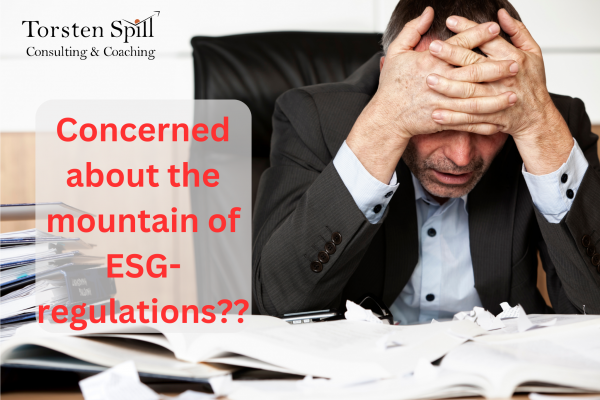In many conversations with entrepreneurs and executives, I heard again and again what “kind of madness” politics and society demand of the companies with regard to ESG obligations (environmental, social, governance). Occasionally I even heard voices that spoke of stopping, giving up or relocating abroad due to the disclosure, reporting and implementation obligations for sustainable management. Since I have dealt with all content systematically, I can understand these concerns, especially from small and medium-sized companies, very well. But as a mathematician, such complexities tend to motivate me and I look for solutions through systematization and order. A few tips on how you should look at the “ESG regulations mountain” from my point of view can be found here:
- Realize that you can no longer reverse these social upheavals. The essential transformations have been decided in principle by the parliaments in Europe and are supported by a large majority, mostly driven by the noticeable climate change.
- Realize that you don’t have to tackle everything at once. Starting a gradual implementation of more sustainable management now makes more sense than waiting. If the obligations of companies come into force in the next few years, the ESG regulation mountain will become a concrete wall!
- Realize that you cannot become “sustainable”. You can only set up your company in such a way that you continuously work on becoming more sustainable. In principle, the legal regulations (EU taxonomy or CSRD) demand exactly this.
- Check with a few colleagues from the production, logistics, quality management and human resources in a few workshop hours which sustainability aspects work in your company through checklists. You will see that you can then use the overview you gain on the topic to visualize your important options for action.
- Get involved in associations and business initiatives on the subject of “green transformation“. The chambers of commerce offer information events. Exchange ideas with other entrepreneurs. Find out that others have had good experiences with their transformation initiatives or that you may be further ahead than others in some respects.
- Get involved with the introduction of systematic sustainability management in your company. The key point is to determine the material sustainability issues for your company. Introduce implementation, measurement and control strategies. If you succeed, future reporting and disclosure obligations are “waste products” of the system.
- However, you cannot avoid creating capacities for this. In small and medium-sized companies with 50 or more employees, my experience is that you need about a half-time position for sustainability management, and from 200 onwards you probably need a full-time employee. A high degree of participation by all employees can reduce the effort. A sustainability officer must be closely linked to management and have cross-departmental competencies.
Don’t be fooled. More or less all companies in Europe (but also in the USA and UK) are under this political and social pressure. See more sustainable management as an opportunity to make your company more competitive and resilient. What do you think about this? Send a message to me by e-mail.
